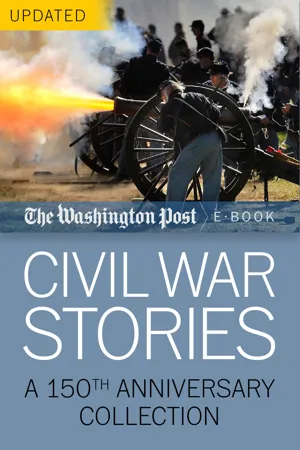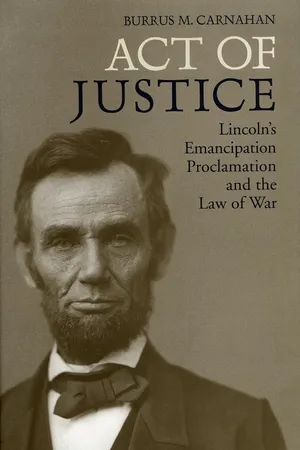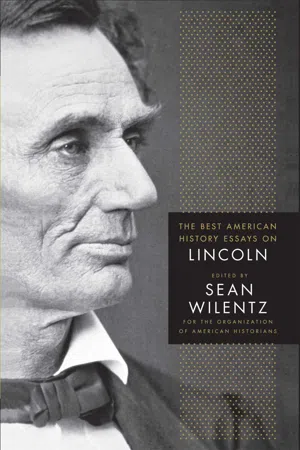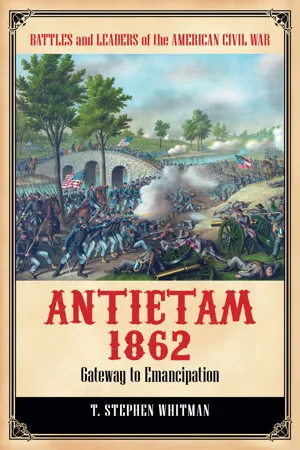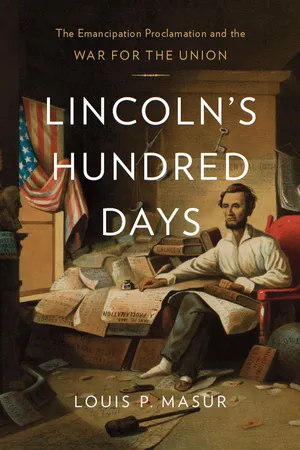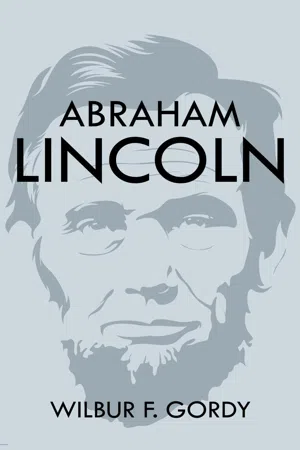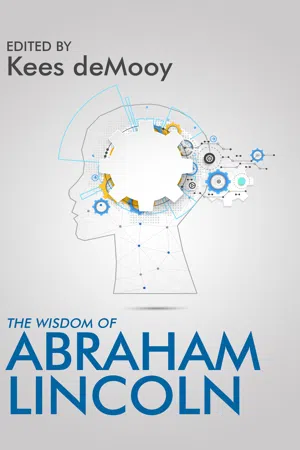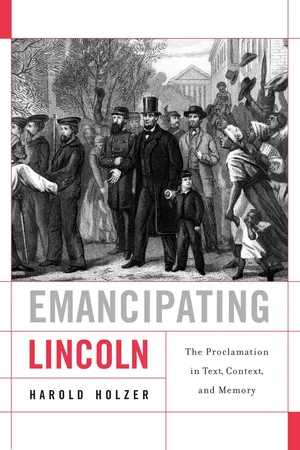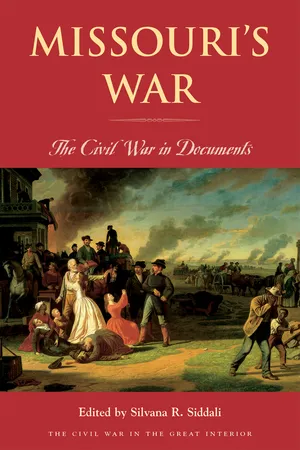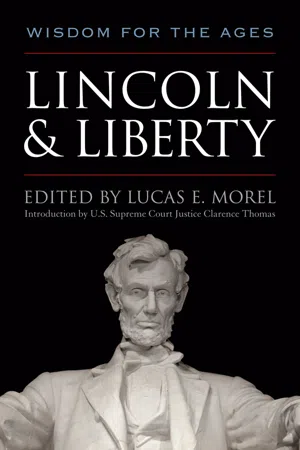History
Emancipation Proclamation
The Emancipation Proclamation was an executive order issued by President Abraham Lincoln on January 1, 1863, during the American Civil War. It declared that all enslaved people in Confederate-held territory were to be set free. While it did not immediately free all enslaved individuals, it marked a significant turning point in the fight against slavery and laid the groundwork for the eventual abolition of slavery in the United States.
Written by Perlego with AI-assistance
Related key terms
1 of 5
10 Key excerpts on "Emancipation Proclamation"
- eBook - ePub
Civil War Stories
A 150th Anniversary Collection
- The Washington Post(Author)
- 2014(Publication Date)
- Diversion Books(Publisher)
And yet this document of war remains a sacred document of democracy, testament to the messiness rather than the ideals of governing. In an age when Western democracies are confronted by new forms of authoritarianism, which offer prosperity and security in exchange for political quiescence, the Emancipation Proclamation forces us to think about the fundamental vexations of representative government: Is democracy capable of resolving grand crises? Can we defend against terrorism without compromise to liberty? Can we reform our economies and free ourselves from crippling debts? Can we stave off environmental apocalypse? In short, is democracy capable of great things?Both celebrated and condemnedIf you can make your peace with the Emancipation Proclamation, you can make your peace with Lincoln. The president claimed it as the signal accomplishment of his administration, and it established him in the minds of free slaves and the annals of popular history as “the Great Emancipator.” Parsing the document may be the most productive and inconclusive franchise in Lincoln scholarship. Over the past 150 years, it has been celebrated as the death knell of slavery yet condemned as an unconstitutional usurpation of power, a capitulation by the president to his radical left flank, proof of Lincoln’s slow and inadequate evolution toward racial justice, a mere tool in the prosecution of the war, a political gambit to demoralize the South, a reckless invitation to race war, and both the least and the most that a cautious, deliberate leader could manage at the moment.During his presidential campaign, Lincoln promised that his personal opposition to slavery wouldn’t affect the institution where it was legal. And while the Civil War was first prosecuted with assurances that the goal was the restoration of union, not abolition, Lincoln began dropping hints of of a general emancipation in the summer of 1862.His record on slavery up to that time had been mixed. He had countermanded or discouraged orders by Union generals freeing slaves in Missouri, South Carolina, Georgia and Florida, citing presidential prerogatives and the necessity of placating the slave-holding but still-loyal border states. But he had also signed an April 1862 bill that abolished slavery in the District of Columbia, and a few months later he freed slaves throughout U.S. territories. - eBook - ePub
Act of Justice
Lincoln's Emancipation Proclamation and the Law of War
- Burrus M. Carnahan(Author)
- 2007(Publication Date)
- The University Press of Kentucky(Publisher)
The president had been told that the effectiveness of an Emancipation Proclamation would depend on whether it motivated an enslaved people to act. When Lincoln met with a delegation of Chicago ministers on September 13, 1862, he asked them why they thought an Emancipation Proclamation from the president would have more impact than section 9, which, he observed, had not “caused a single slave to come over to us.” The ministers replied “that when the proclamation should become widely known (as the law of Congress has not been) it would withdraw the slaves from the rebels, leaving them without laborers, and giving us both laborers and soldiers.” 7 A presidential proclamation would achieve a notoriety that an obscure section of an act of Congress would not, and consequently would have a greater psychological impact. By declaring that the Federal government recognized the present freedom of all persons enslaved in the Confederacy, the Emancipation Proclamation made it clear that anyone who worked or fought for the Union was also working and fighting to bring freedom to every slave still in rebel territory as of January 1, 1863. A refugee could, in good conscience, flee to Union forces in the belief that he or she would be given a chance to work toward the freedom of loved ones left behind. By recognizing the freedom of a subject people, Lincoln was striking at the power of the Confederate government in much the same way that France had struck at the power of the British government in 1778 by recognizing the United States as an independent nation. The Confederates had hoped for similar support from Britain and France for its own independence - eBook - PDF
- Kenneth A. Loparo, Organization of American Historians, S. Wilentz(Authors)
- 2016(Publication Date)
- Palgrave Macmillan(Publisher)
The significant feature of the proclamation was the provision that called for the emancipation of the slaves of January 1, 1863, in those states or parts of states that were then in rebellion against the United States. The clear implication was that if states or portions of states were not in rebellion on January 1, 1863, the Proclamation would not apply to them. Apparently, in such areas the President would seek to develop some plan of voluntary immediate or gradual emancipation. It was this provision that was to provoke the greatest amount of reaction in the months that followed. The body of the Preliminary Emancipation Proclamation is in Lincoln’s own hand, the penciled additions in the hand of the Secretary of State, and the final beginning and ending in the hand of the chief clerk. The document was presented by the President to the Albany Army Relief Bazaar held in February and March, 1864. Gerrit Smith, the abolitionist leader, purchased it for $1,000 and gave it to the United States Sanitary Commission. In April 1865, the New York Legislature appropriated $1,000 for its purchase and it was placed in the State Library. It is still in the possession of the New York State Library. The text, with the Lincoln and Seward emendations, follows: BY THE PRESIDENT OF THE UNITED STATES OF AMERICA A Proclamation I, Abraham Lincoln, President of the United States of America, and Commander-in-Chief of the Army and Navy thereof, do hereby proclaim and declare that hereafter, as heretofore, the war will be prosecuted for the object of practically restoring the constitutional relation between the United States, and each of the states, and the people thereof, in which states that relation is, or may be suspended, or disturbed. That it is my purpose upon the next meeting of Congress to again recommend the adoption of a practical measure tendering pecuniary - eBook - ePub
Antietam 1862
Gateway to Emancipation
- T. Stephen Whitman(Author)
- 2012(Publication Date)
- Praeger(Publisher)
7
Lincoln Emancipates and Voters React
On Monday, September 22, Lincoln read his Preliminary Emancipation Proclamation to his cabinet and promulgated it. It had been in his desk for two months, but now he seized on victory at Antietam, however frustratingly incomplete, to free the slaves. The proclamation was justified exclusively on grounds of military necessity. Lincoln stuck to his view that emancipation could be better defended legally as a military measure than if “issuing from the bosom of philanthropy.”1 It retained references to the possibility of compensated emancipation and to colonization of freed people by their consent. It exempted the loyal border states and some rebellious areas under Union control, in Tennessee, Louisiana, and Virginia. And it gave southerners 100 days to lay down arms and resume their proper relations as states within the Union. But the proclamation put out the word that failing such actions, nearly three million persons would be forever free on January 1, 1863. Perhaps the proclamation’s most controversial line stated that the government “will do no acts to repress such persons, or any of them, in any efforts they make for their actual freedom,” read by critics as inciting slaves to rebel and kill their masters.Lincoln’s leaks to friends and political allies, and especially his public letter of late August to Greeley had helped prepare the public for the proclamation. But the president had preserved the appearance of openness to supporting or resisting the proposition of emancipation. As late as September 13, he told a delegation of antislavery Christians from Chicago that he feared that an Emancipation Proclamation might have far less practical effect than most antislaveryites claimed, thereby eliciting their arguments to the contrary. Lincoln closed this interview by affirming that he had no objections to a proclamation on constitutional or legal grounds. He was sure that “as Commander in Chief in time of war, I suppose I have a right to take any measure which may best subdue the enemy,” underlining his key point of justification.2 - eBook - ePub
Lincoln’s Hundred Days
The Emancipation Proclamation and the War for the Union
- Louis P. Masur(Author)
- 2012(Publication Date)
- Belknap Press(Publisher)
23From London, Henry Adams rejoiced: “The Emancipation Proclamation has done more for us here than all our former victories and all our diplomacy. It is creating an almost convulsive reaction in our favor all over this country.” And John Murray Forbes heard from one correspondent that “so far from the Proclamation being a cause of embarrassment to the government, it has been and is, with regard to the feeling in Europe, the great source of their strength: and I did not hesitate to tell the President that had it not been for the anti-slavery policy of his government there would have been much greater difficulty in preventing a recognition of the Southern States.”24One writer, the abolitionist Maria Weston Chapman, could not find graceful expressions for her joy, so she resorted to exclamations: “Hurrah! Hosanna! Hallelujah! Laudamus! Nunc dimittis! Jubilate! Amen!”25Perhaps the most eloquent celebration of the meaning of the Proclamation came in images, rather than in words. Thomas Nast, only twenty-three years old and at the beginning of a long and influential career as a cartoonist for Harper’s Weekly, published an illustration titled “The Emancipation of the Negroes” on January 23. It offers a panorama of black history. At the center is a fanciful vision of middle-class domestic harmony, showing a free black family gathered by the hearth. The boy holds a book in his hand. According to the key published in the paper, “On the wall hangs a portrait of Abraham Lincoln, whom the family cannot sufficiently admire and revere.” Also on the wall is a banjo, “a source of never-ending enjoyment and recreation.”At the top of the picture is the Goddess of Liberty. At the bottom, Father Time—holding a child, who represents the New Year—is “striking off the chains of the bondman and setting him at liberty forever.” Prints of Nast’s picture would include a significant change: instead of Father Time, a distinct portrait of Abraham Lincoln would occupy the pendant. The left side depicts scenes of slavery: fugitive slaves, a slave auction, a whipping, and a family group being separated. On the right side are images of the future, characterized by heroism, religion, education, and “negroes receiving pay for their faithful labor.” - eBook - ePub
- Wilbur F. Gordy(Author)
- 2021(Publication Date)
- Left Of Brain Onboarding Pty Ltd(Publisher)
CHAPTER IX .LINCOLN AND THE Emancipation ProclamationAs you will recall, in his inaugural address on March 4, 1861, it was not slavery that President Lincoln emphasized but the preservation of the Union. This continued to be his chief aim. He believed that upon that great issue he could keep the people of the Northern States united. He also knew that in the border States, Maryland, Kentucky, and Missouri, there were many pro-slavery men who were also pro-Union men, and it was a matter of the first importance to prevent these States from joining the ranks of secession. “These all against us, he said, “and the job on our hands is too large for us. We would as well consent to separation at once, including the surrender of the capital.” He felt sure that, if he should interfere with slavery within their borders, they would be likely to go out of the Union.But with this cautious policy all his subordinates did not agree, and two of his generals took matters into their own hands. On August 30, 1861, General Frémont, who held command in the Western Department, declared martial law there, and at the same time stated that the slaves of men who were fighting against the Union were free men. This was going quite beyond his rightful authority, and Lincoln, refusing to approve the order, declared it void. He believed that to take such a step would turn the balance in the wavering border States in favor of secession. In the following May another commander, General Hunter, declared the slaves free in South Carolina, Georgia, and Florida. Again Lincoln refused to approve, and the order was made void.In refusing to sanction the drastic actions of Fremont and Hunter, the President met with bitter criticism from many radical anti-slavery men. They mercilessly censured him. They insisted that he was too cautious; that his policy was lame and halting; that he himself was not a bold and heroic executive, such as the momentous issues of the hour demanded. - eBook - ePub
- Kees de Mooy(Author)
- 2018(Publication Date)
- Citadel Press(Publisher)
I admit that slavery is the root of the rebellion, or at least its sine qua non. The ambition of politicians may have instigated them to act, but they would have been impotent without slavery as their instrument.... I have not decided against a proclamation of liberty to the slaves, but hold the matter under advisement; and I can assure you that the subject is on my mind, by day and night, more than any other. Whatever shall appear to be God’s will, I will do.(NH VIII, 32-33)September 22, 1862 When news of the Union victory at Antietam reached President Lincoln, he decided to issue the Emancipation Proclamation.That on the first day of January, in the year of our Lord one thousand eight hundred and sixty-three, all persons held as slaves within any state or designated part of a state the people whereof shall then be in rebellion against the United States, shall be then, thenceforward, and forever free; and the executive government of the United States, including the military and naval authority thereof, will recognize and maintain the freedom of such persons, and will do no act or acts to repress such persons, or any of them, in any efforts they make for their actual freedom.(NH VIII, 37)September 24, 1862 Response to a group of well-wishers gathered to celebrate the Emancipation Proclamation.What I did, I did after a very full deliberation, and under a very heavy and solemn sense of responsibility. I can only trust in God I have made no mistake. (NH VIII, 44)December 1, 1862 In his annual message to Congress, Lincoln remained cautiously optimistic about the possibility of colonization.Liberia and Haiti are as yet the only countries to which colonists of African descent from here could go with certainty of being received and adopted as citizens; and I regret to say such persons contemplating colonization do not seem so willing to migrate to those countries as to some others, nor so willing as I think their interest demands. I believe, however, opinion among them in this respect is improving; and that ere long there will be an augmented and considerable migration to both these countries from the United States. - eBook - ePub
Emancipating Lincoln
The Proclamation in Text, Context, and Memory
- Harold Holzer(Author)
- 2012(Publication Date)
- Harvard University Press(Publisher)
If the document whose words finally came across the telegraph wires that afternoon bore none of the grandeur or Book of Exodus fervor for which Douglass and others had yearned, it nonetheless soon achieved the iconic status of a holy writ—even if it later distressed people rereading it. It is little wonder that Douglass himself called Lincoln the “black man’s President” in 1865, yet at the dedication of an emancipation sculpture in Washington just eleven years later reversed himself completely and described him as “preeminently the white man’s president.” 24 The proclamation—both at first blush and in retrospect—had a way of inspiring conflicted reactions. Right or wrong, the proclamation has earned twin, concurrent, and disparate reputations as both a freedom icon and a rhetorical failure, as the kind of relic Barack Obama could proudly display generations after fair-goers greeted it tepidly and years after historians savaged it. And perhaps nothing better illustrates these oddly conflicting historical currents than the document’s own strange history as both a talisman and a piece of literature and archival history, a parallel legacy directly influenced by two of the nation’s unique Civil War social movements: the mostly political Union League movement, dedicated to Republican politics and black enlistment, and the U.S. Sanitary Commission movement, dedicated to the care and feeding of Union soldiers and sailors, especially the wounded. Both of these organizations played major roles in burnishing the reputation of the proclamation among the public. They ignored its shortcomings as political literature and secular gospel, sidestepped its inflammatory ability to generate controversy in racist white America, and instead embraced its potential as a relic of almost messianic power. Lincoln’s personal participation in this metamorphosis is particularly illuminating - eBook - ePub
Missouri's War
The Civil War in Documents
- Silvana R. Siddali(Author)
- 2014(Publication Date)
- Ohio University Press(Publisher)
Proslavery Missourians denounced the Preliminary Emancipation Proclamation. For example, the Democratic editor of the Conservator,THE Emancipation Proclamation.a paper published in Platte City, freely voiced his opposition. Platte City is very close to the Kansas border, just south of Kansas City. Even the most loyal residents of Platte City were likely to retain some bitter memories of the Union army’s policies toward civilians. On December 16, 1861, Colonel W. James Morgan, in command of the Eighteenth Missouri Infantry, had burned the courthouse and most of the city to the ground in an effort to capture bushwhacker Silas M. Gordon. The editorial was somewhat mistaken, however, as to the scope of the proclamation; slaves owned by Missourians or by residents of any other loyal border state were not freed by the document. In another column, the paper gave the full text of the proclamation under the headline “Mr. Lincoln’s Proclamation. The Niggers To Be Set Free!! ‘The End of the Beginning.’”President Lincoln has on several occasions intimated that the abolition element with which he had to contend, the assistance of which he considered indispensably necessary for the restoration of the Union, would probably compel him, eventually, to proclaim some new dogma in behalf of the African slave; that interference with the institution of slavery might be necessary. We have believed, however, that President Lincoln was too wise a man to ever take such a step; and that his intimations of such a policy were only for the purpose of appeasing the howls of the abolition party. We had flattered ourselves that the President was prosecuting this war for the preservation of the Constitution as well as the restoration of the Union. But, alas! we are forced to admit that such is not the case.We fail to see any good that can result from the President’s Proclamation; but we can see much harm that is inevitable. The rebel leaders who have always insisted that the great object of the Federal Government was to completely annihilate the institution of slavery, will lay hold upon this and prove thereby, that their prophecies are being fulfilled, and thus, establish themselves as wise and far-seeing men, meriting the confidence of the people; and at the same time discourage loyal citizens living in the rebel States. - eBook - PDF
Lincoln and Liberty
Wisdom for the Ages
- Lucas E. Morel(Author)
- 2015(Publication Date)
- The University Press of Kentucky(Publisher)
Lincoln did not disagree, admitting that once the proclamation took effect, “the character of the war will be changed. It will be one of subjugation and extermination.” 96 But, as he wrote to another cor- respondent, “This government cannot much longer play a game in which it stakes all, and its enemies stake nothing. Those enemies must understand that they cannot experiment for ten years trying to destroy the government, and if they fail still come back into the Union unhurt.” Lincoln took particular exception to the demand by loyal slaveholders “that the government shall not strike its open enemies, lest they be struck by accident.” This demand by border-state representatives, who had recently rejected Lincoln’s last proposal for compensated emancipation, had become “the paralysis—the dead palsy—of the government in this whole struggle.” 97 The stronger medicine represented by the Emancipation Proclamation was necessary because the Confederacy was just now exerting its maximum effort to mobilize its population for war. In April 1862, the Confederate congress passed a conscription act. Then, abandoning the “cordon” defense that had permitted Union armies to penetrate Confederate territory as far as northern Mississippi in early 1862, the Confederacy organized its mobilized manpower into field armies. One of these forces, Braxton Bragg’s Army of Tennessee, struck Grant at Shiloh. Lee’s Army of Northern Virginia drove McClellan back from the gates of Richmond. Then in the fall of 1862, the former invaded Kentucky, and the latter invaded Maryland. To a great extent, the South was able to do this only because slave labor freed white men to fight. Emancipation could undermine the slave labor system of the South, thereby undercutting the Confederate effort to mobilize its military resources. From a military standpoint, emancipation was a war measure designed to attack the Southern economy directly.
Index pages curate the most relevant extracts from our library of academic textbooks. They’ve been created using an in-house natural language model (NLM), each adding context and meaning to key research topics.
